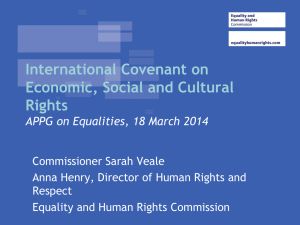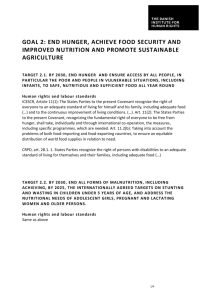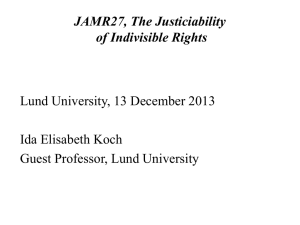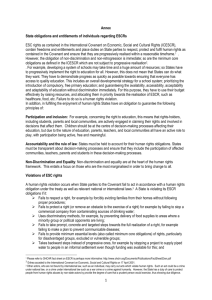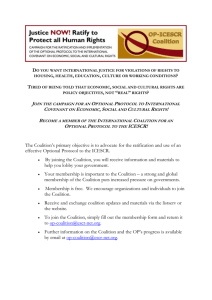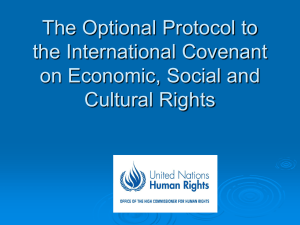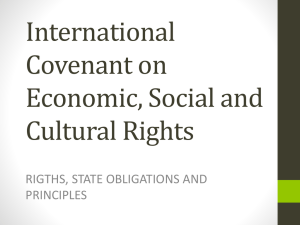the optional protocol of the international covenant on economic
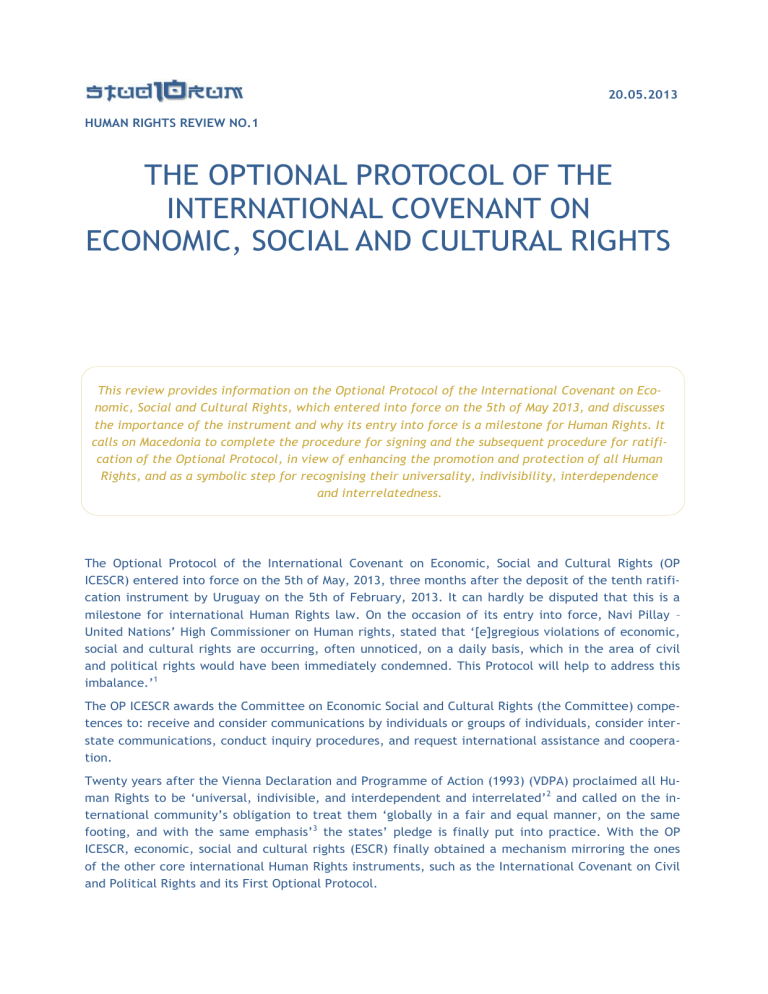
20.05.2013
HUMAN RIGHTS REVIEW NO.1
THE OPTIONAL PROTOCOL OF THE
INTERNATIONAL COVENANT ON
ECONOMIC, SOCIAL AND CULTURAL RIGHTS
This review provides information on the Optional Protocol of the International Covenant on Economic, Social and Cultural Rights, which entered into force on the 5th of May 2013, and discusses the importance of the instrument and why its entry into force is a milestone for Human Rights. It calls on Macedonia to complete the procedure for signing and the subsequent procedure for ratification of the Optional Protocol, in view of enhancing the promotion and protection of all Human
Rights, and as a symbolic step for recognising their universality, indivisibility, interdependence and interrelatedness.
The Optional Protocol of the International Covenant on Economic, Social and Cultural Rights (OP
ICESCR) entered into force on the 5th of May, 2013, three months after the deposit of the tenth ratification instrument by Uruguay on the 5th of February, 2013. It can hardly be disputed that this is a milestone for international Human Rights law. On the occasion of its entry into force, Navi Pillay –
United Nations’ High Commissioner on Human rights, stated that ‘[e]gregious violations of economic, social and cultural rights are occurring, often unnoticed, on a daily basis, which in the area of civil and political rights would have been immediately condemned. This Protocol will help to address this imbalance.’ 1
The OP ICESCR awards the Committee on Economic Social and Cultural Rights (the Committee) competences to: receive and consider communications by individuals or groups of individuals, consider interstate communications, conduct inquiry procedures, and request international assistance and cooperation.
Twenty years after the Vienna Declaration and Programme of Action (1993) (VDPA) proclaimed all Human Rights to be ‘universal, indivisible, and interdependent and interrelated’ 2 and called on the international community’s obligation to treat them ‘globally in a fair and equal manner, on the same footing, and with the same emphasis’ 3 the states’ pledge is finally put into practice. With the OP
ICESCR, economic, social and cultural rights (ESCR) finally obtained a mechanism mirroring the ones of the other core international Human Rights instruments, such as the International Covenant on Civil and Political Rights and its First Optional Protocol.
STUDIORUM HUMAN RIGHTS REVIEW No.1
BRIEF NOTE ON THE HISTORY OF THE OP ICESCR AND THE FORMERLY CONTESTED
NATURE OF ECONOMIC, SOCIAL AND CULTURAL RIGHTS
Getting the governments to agree on the need for an additional instrument, such as the OP ICESCR and to start its drafting procedure took many years. The International Covenant on Economic, Social and Cultural Rights (ICESCR) is the last of the core international Human Rights instruments to be provided with legal grounds that vest its mechanism with a mandate to go beyond monitoring the implementation of the ICESCR by considering state’s reports.
This unfortunate delay derives from the debate about the nature of ESCR. The main arguments against ESCR were: decisions on these rights should not be made by courts, but by policy makers (i.e.
these rights challenge the separation of powers), as these would demand changes in public policies; these rights should be viewed only as goals to be aspired to; they have major budgetary implications; courts do not have the necessary expertise to understand the scope of ESCR, thus cannot properly deliver justice in cases of violations of these rights.
The debate was not only settled by the VDPA, but also through the practice of national courts. The many cases from national jurisdictions show that the courts are willing and able to deliver justice in cases concerning violations of ESCR, as they are for the civil and political rights (CPR) cases. Thus, practice discredited the justiciability argument and confirmed that States have an obligation to progressively realise ESCR subject to their resource capacity. Courts’ decisions in ESCR cases are not inconsistent with the separation of powers more than are numerous decisions on CPR. As for the expertise of the courts to adjudicate ESCR cases, there is already a widespread practice of courts to seek expert guidance when needed.
COMPETENCES VESTED IN THE COMMITTEE UNDER THE OP ICESCR
1. Communications by individuals and groups of individuals
With the OP ICESCR, the Committee can receive and consider communications by individuals or groups of individuals under the jurisdiction of a State Party who claim to be victims of a violation of any of the rights enshrined in the ICESCR. The admissibility rules for these communications include the following: exhaustion of domestic remedies (except in cases where these have been unreasonably prolonged); submit within one year of exhaustion of the domestic remedies; facts of the case occurred after the entry into force of the OP ICESCR, or are a continuation of actions taken before this date; same matter has not been examined by the Committee or by another international forum; the communication is compatible with the provisions of the ICESCR; it is not manifestly ill-founded or based predominantly or solely on information from mass media; it is not anonymous and is in writing; and it is not an abuse of the right to submit a communication. Communications for which the Committee considers that an issue of clear disadvantage has not risen may be declined consideration, unless it finds the issue to be of general importance. The Committee can order interim measures to avoid possible irreparable damage to the victim or victims of the alleged violations.
4
2. Inter-state communications
Provided that the State Party has declared it recognizes the competence of the Committee under Article 10 of the OP ICESCR, the Committee can consider inter-state communications concerning another State Party that has also accepted the competence of the Committee.
5
2
OP OF THE ICESCR
3. Inquiry procedures
Provided that the State Party has declared it recognizes the competence of the Committee under Article 11 of the OP ICESCR, the Committee can conduct inquiries based on reliable information indicating grave or systematic violations by a State Party of any of the rights in the ICESCR.
6 The inquiries are confidential, and may result in findings and recommendations made by the Committee and communicated to the State Party. The State Party may also be requested to submit a follow-up report on measures taken in relation to the inquiry.
7
4. International assistance and cooperation
In view of the recommendations made in the communications and inquiry procedures, the Committee may request technical advice or assistance from the UN specialised agencies, funds and programmes.
The OP ICESCR also provides for the establishment of a trust fund to assist State Parties in enhancing the implementation of the rights as provided by the ICESCR.
8
MACEDONIA AND THE ICESCR AND ITS OPTIONAL PROTOCOL
Macedonia is a State Party to the ICESCR by succession. It has been reporting to the Committee on the implementation of the ICESCR with major delays, contrary to its legal obligations. Its first report was due in 1993, but was submitted in 2005. The combined second, third and fourth reports were due in
2008, but have not yet been submitted.
9 The submission of this report, whose preparation is currently under way, is planned for autumn 2013.
10
Macedonia still has neither signed nor ratified the OP ICESCR. A recommendation towards this step was included in several UN reports, including in the recommendations of the Universal Periodic Review (UPR). In its UPR mid-term report, updated with information up to December 2011, the Government reiterated that it accepts the UPR recommendations concerning the OP ICESCR, and that a procedure to this end is underway. Although there has been no official progress on this at the date of the publication of this review, 11 according to information from the Ministry of Foreign Affairs, this Ministry jointly with the Ministry of Labour and Social Policy are advancing with the preparations for signing of the OP ICESCR, and are aiming to complete the procedure in the course of this year, and before submitting the UPR report which is due in October 2013.
12
In view of the importance of enhancing the promotion and protection of all Human Rights, recognising their universality, indivisibility, interdependence and interrelatedness, and acting upon the accepted
UPR recommendation, Macedonia needs to complete the procedure for signing and the subsequent procedure for ratification of the OP ICESCR before October 2013. It is recommended that Macedonia makes a declaration recognizing the competence of the Committee as per Article 10 and Article 11 of the OP ICESCR, which will open the possibility for inter-state communications and inquiry proceedings. The country’s track record on reporting to UN human rights treaty-bodies needs to be improved, starting with a submission of the pending combined second, third and fourth reports, and putting into practice mechanisms that will ensure subsequent timely reporting.
3
STUDIORUM HUMAN RIGHTS REVIEW No.1
ENDNOTES
1 ‘Pillay hails new step in protection of economic, social and cultural rights’.
OHCHR Website .
<http://www.ohchr.org/EN/NewsEvents/Pages/DisplayNews.aspx?NewsID=13300&LangID=E>. Last accessed: 06.05.2013
2 Vienna Declaration and Programme of Action (1993). Part I, para.5
3 Ibid.
Part I, para.5
4 Optional Protocol to the International Covenant on Economic, Social and Cultural Rights (2008).
Art.1-5
5 Ibid . Art.10
6 Ibid . Art.11
7 Ibid . Art.11,12
8 Ibid . Art.14
9 Information retrieved from the OHCHR on March 10 th , 2013: http://www.unhchr.ch/tbs/doc.nsf/
NewhvVAllSPRByCountry?OpenView&Start=1&Count=250&Expand=173.5#173.5 . This information overlaps with the information provided on the link with the sessions of the Committee, where it can be seen that Macedonia was last discussed in 2006, and in relation to its initial report submitted in
2005. <http://www2.ohchr.org/english/bodies/cescr/sessions.htm>
10 Information obtained from Svetlana Geleva, State Councillor for Multilateral Affairs, Ministry of Foreign Affairs.
11 Information retrieved from the Treaty Office of the UN on March 10 th , 2013: <http:// treaties.un.org/Pages/ViewDetails.aspx?src=TREATY&mtdsg_no=IV-3-a&chapter=4&lang=en>
12 Information obtained from Svetlana Geleva, State Councillor for Multilateral Affairs, Ministry of
Foreign Affairs.
Centre for Regional Policy
Research and Cooperation
‘Studiorum’
Nikola Parapunov 41
1000 Skopje, Macedonia tel/fax: +389.2.3065.837
office@studiorum.org.mk
Author: Biljana KOTEVSKA
Reviewer: Prof. Paul HUNT
About the STUDIORUM HUMAN RIGHTS REVIEW:
The STUDIORUM Human Rights Review aims to bring the global developments on
Human Rights closer to the Human Rights defenders in order to assist their efforts to keep pace with these developments and to encourage them to use them more as sources in their everyday work.
